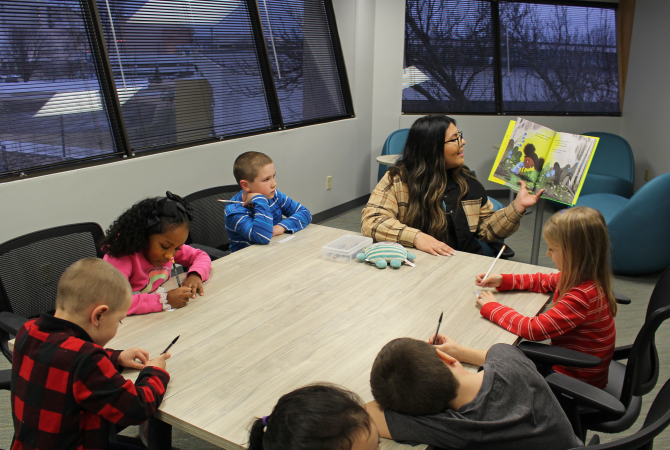June 4, 2024
In-School Grief Groups Help Students Process Emotions of Loss

While most adults associate grief with the death of a loved one, children experience grief for a variety of reasons. The loss of a loved one, whether a family member, friend or pet, can cause children to experience deep grief — but so can divorce, moving, a parent’s job loss, military deployment or even the loss of a friendship.
To help a grieving child, adults should be open to understanding all these types of losses and provide an opportunity for young people to discuss them openly and honestly. Unresolved grief in children can lead to anger, guilt, depression and anxiety. Some children may experience academic problems and bereavement in childhood has even been associated with higher rates of physical health problems later in life.
EveryStep’s school-based grief groups meet children where they are to help process the grief they experience. Alyssa Halferty is a school counselor at Oak Park Elementary in Des Moines, where EveryStep facilitators help children address the challenges associated with grief.
“We have had a lot of students who have lost loved ones,” says Alyssa. “We were unsure of how to talk to the kids about that, so I reached out to somebody with more experience and knowledge in talking about grief. EveryStep has provided me with a lot of resources and information about discussing death with our students.”
Learn How EveryStep Supports Children
Alyssa said says she was familiar with EveryStep’s Amanda the Panda childhood grief program because as a teenager, she experienced the death of a family member and her family attended some EveryStep events.
Alyssa says the in-school grief groups, facilitated by EveryStep, remove the stigma of talking about death and the feelings associated with it. “They encourage the kids to talk about memories and they do fun activities. Our kids love the activities they do. The people who facilitate the groups are consistent and they’re actively engaged with the kids, making them more comfortable talking about their feelings, their experiences, and asking questions and telling their story.”
Connect with EveryStep
Even though only in elementary school, Alyssa says many of her students have already experienced violence at home or in their community, along with other traumas just as impactful to a young mind, including parents who are critically ill or dying, and the loss of classmates.
One session of the school grief group helped address the death of a student who died while visiting another country. “Taylor (Clemens, EveryStep Grief & Loss Services program coordinator) really allowed the kids to ask questions, because they were really confused — he was on vacation, but now he’s not coming back. What’s going on?” says Alyssa. “As the group went on, we noticed other kids were struggling with the death of a grandparent.”
As part of the in-school grief groups, EveryStep also provides resources to families. “The feedback I've gotten from a lot of our students and the families is that they feel more comfortable talking about death and their feelings,” says Alyssa. “It’s made it easier for parents to have more of a hands-on approach now that they have the tools and resources needed to have those conversations with their kids and family.
“I would really like to see more schools utilize EveryStep. They’re very responsive, quick, and open to any feedback or needs. I really love working with them, and so do our kids.”
Make a Gift Today
Amanda the Panda provides six-week in-school support groups throughout the year on a first-come, first-served limited basis. The in-school groups are unique to other Amanda the Panda programs because they are open to students who have experienced losses beyond death of a loved one, such as loss from divorce, custody removal, absence of a caregiver, terminal diagnosis of a loved one and more. If you have questions, please email griefandloss@everystep.org. For more information and resources, click here.